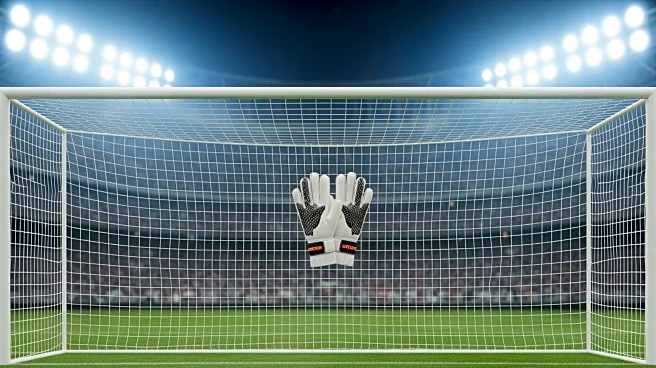What's Happening?
FIFA has released the shortlist for the 2025 Best Men's Goalkeeper award, featuring eight nominees from top football clubs worldwide. The list includes Alisson Becker from Liverpool, Thibaut Courtois from Real Madrid, Gianluigi Donnarumma from Manchester
City, Emiliano Martinez from Aston Villa, Manuel Neuer from Bayern Munich, David Raya from Arsenal, Yann Sommer from Inter Milan, and Wojciech Szczęsny from Barcelona. Emiliano Martinez, last year's winner, is again in contention. The winner will be decided through a voting process that concludes on November 28. Gianluigi Donnarumma, who is also on the list, recently received the Yashin trophy, highlighting his exceptional performance.
Why It's Important?
The announcement of the FIFA Best Men's Goalkeeper shortlist is significant as it recognizes the top performers in the position, highlighting their contributions to their respective teams. This award can enhance the players' reputations and market value, impacting their careers and the clubs they represent. The recognition also underscores the importance of goalkeeping in football, a role often overshadowed by outfield players. For clubs, having a player nominated can boost their prestige and attract more fans and sponsors, influencing their financial and competitive standing.
What's Next?
The voting process for the award will continue until November 28, after which the winner will be announced. This period allows fans, players, and stakeholders to engage in discussions and predictions about the potential winner. The outcome could influence future transfers and contract negotiations for the nominees, as clubs may seek to capitalize on their players' elevated status. Additionally, the award ceremony will likely draw significant media attention, further promoting the sport and its top talents.
Beyond the Headlines
The nomination process and subsequent award can have deeper implications for the sport, such as influencing young athletes aspiring to become goalkeepers. It highlights the evolving role of goalkeepers in modern football, where they are increasingly involved in playmaking and tactical decisions. This shift may lead to changes in training methodologies and scouting priorities, as clubs look for goalkeepers with diverse skill sets.

















